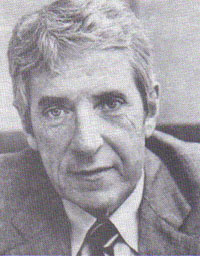Jim Finks
Year of Induction: 1985 | Categories: Football, Individual
 The man who excelled in sports at the high school level attaining All-State honors in football, and went on to become general manager of the Minnesota Vikings and the Chicago Bears, of the National Football League, and president of the Chicago Cubs, of the National League, and general manager of the New Orleans Saints was inducted into the Hall of Fame in 1985.
The man who excelled in sports at the high school level attaining All-State honors in football, and went on to become general manager of the Minnesota Vikings and the Chicago Bears, of the National Football League, and president of the Chicago Cubs, of the National League, and general manager of the New Orleans Saints was inducted into the Hall of Fame in 1985.
Jim Finks, a 1945 graduate of SCHS, was named to both the Champaign News-Gazette and the Chicago Daily News All-State teams his senior year. During the 1944 football season, with Salem compiling an 8-1 record, Finks scored 100 points, had 2107 yards of total offense (rushing for 1332 yards), passing for nine touchdowns. He was the team’s punter, averaging 43.2 yards per kick on 22 punts.
In basketball, Finks was team captain his senior year and scored 795 points his final two years. As a sophomore, he was a member of the 1943 Wildcat team that captured third place honors in the state tournament. In 1944, his junior year, the Wildcats reached the sectional finals before bowing out, the last time that Salem has won a regional tournament.
Excellence and honors continued at Tulsa University. His sophomore year, he carried a 37 yard punting
average, a 15.8 yard average on kick-off returns, was second in team passing, with a 55·yard scoring strike to help defeat Wichita University, and was a defensive star, once blocking an extra point try to preserve a 14-13 Tulsa victory over Arkansas.
As a junior, as first team quarterback, Finks hit 10 of 15 passes to net a 30-22 win for Tulsa over Detroit, scored the lone touchdown in a 7-0 win over Wichita, and was ranked 7th nationally in total offense with 1159 yards. He was selected as quarterback on the Missouri Valley Conference All-Conference Team.
During his senior year, Finks completed 115 passes for 1376 yards, second highest in the nation, was chosen to participate in the East-West Shrine game on New Year’s Day, completing a touchdown pass for the West in a 14-13 loss. Again he was selected Missouri Valley Conference All-Conference Quarterback, and was given the University President’s Award “as the most unselfish and best spirited member of the Tulsa team.”
In basketball he set the Individual Tulsa scoring mark with 28 points against Drake In 1947.
Finks broke into the National Football League In 1949 as a rookie quarterback with the Pittsburgh Steelers. Being a T-formation quarterback at Tulsa and being with a team still employing a single-wing offense, he found himself defending passes. From 1949-51, Finks was a regular in the Steeler secondary.
In 1952, when the Steelers converted to the T-formation, Finks switched back to quarterback. In 1953, he joined Otto Graham as the Eastern Conference quarterbacks in the Pro Bowl. Finks left the pro game to coach Notre Dame’s 1956 backfield under Terry Brennan.
Finks scouted for Calgary in the Canadian League the following season and took over as general manager of the Stampeeders in 1957. He remained at Calgary until moving to Minnesota as the Vikings GM in 1964.
In 10 years with Minnesota in the NFL, Finks brought the Vikings to their first Super Bowl (1970). He
remained with the Vikings through the 1973 season, then tendered his resignation following Minnesota’s second Super Bowl in January 1974. In 1968, he was on the first NFL negotiating committee that met with the Player’s Association.
Finks joined the Chicago Bears September 12, 1974, as executive vice president, general manager and chief operating officer, resigning following the 1983 season. Shortly thereafter, he was named President of the Chicago Cubs of the National League after the Chicago Tribune took over the club from the Wrigley family.
Finks headed the Cub organization through their banner 1984 season when the Cubs won the National League East Division title. He resigned after the 1984 season. Finks was named president and general manager of the New Orleans Saints in 1986, and brought them from the doldrums to a contender roll, making the play offs in 1988.
Finks was elected to the Pro Football Hall of Fame in 1995.